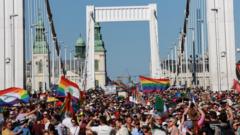Budapest's LGBTQ+ community faces a critical challenge as police have issued a ban on the city's annual Pride march, scheduled for later this month. In response, Mayor Gergely Karacsony has boldly committed to organizing a "Day of Freedom," declaring it a local event that will take place no matter the restrictions. This confrontation reflects ongoing tensions between Prime Minister Viktor Orban’s nationalist government and Hungary's LGBTQ+ advocates, who are backed by some legal decisions from the courts.
**Defiance Ahead of Budapest Pride: Mayor Promises March Will Happen Despite Police Ban**

**Defiance Ahead of Budapest Pride: Mayor Promises March Will Happen Despite Police Ban**
Hungarian authorities have banned the annual Pride march, escalating tensions between the government and LGBTQ+ advocates. Mayor Gergely Karacsony insists the event will proceed as planned on June 28.
The crux of the issue began earlier this year when Orban implied that Pride activities would not be allowed, which was followed by the enactment of a law limiting public gatherings that might conflict with child protection provisions regarding the portrayal of homosexuality. Despite this, Karacsony argued that the city's right to celebrate freedom must prevail against such bans. “They might as well try to ban a procession of unicorns,” the Mayor quipped on social media.
Estimates suggest tens of thousands from Hungary and elsewhere are expected to participate on June 28. Amidst fear of policing tactics such as the use of facial recognition technology, those found to be partaking in the event could potentially face hefty fines. The government remains adamantly opposed, with communications chief Tamas Menczer claiming that "the protection of children trumps all other laws," arguing that Pride is inappropriate for minors.
Past legal rulings by Hungary's Supreme Court have thwarted attempts by police to entirely block Pride events, resulting in ongoing tension about how to celebrate this vital aspect of LGBTQ+ rights in Hungary. An array of additional initiatives for the day are being organized by the Rainbow Mission foundation, which expresses solidarity with the broader goals of Pride, albeit under different categorizations to abide by the new legal restrictions.
Human rights advocates, such as the Hungarian Helsinki Committee, are advising participants on how to navigate any potential legal challenges that may arise, encouraging them to stand firm and reject fines. The outcome of the "Day of Freedom" and the defiance demonstrated by Karacsony could set a significant precedent regarding the exercise of rights in Hungary, amid an increasingly fraught political landscape.
Estimates suggest tens of thousands from Hungary and elsewhere are expected to participate on June 28. Amidst fear of policing tactics such as the use of facial recognition technology, those found to be partaking in the event could potentially face hefty fines. The government remains adamantly opposed, with communications chief Tamas Menczer claiming that "the protection of children trumps all other laws," arguing that Pride is inappropriate for minors.
Past legal rulings by Hungary's Supreme Court have thwarted attempts by police to entirely block Pride events, resulting in ongoing tension about how to celebrate this vital aspect of LGBTQ+ rights in Hungary. An array of additional initiatives for the day are being organized by the Rainbow Mission foundation, which expresses solidarity with the broader goals of Pride, albeit under different categorizations to abide by the new legal restrictions.
Human rights advocates, such as the Hungarian Helsinki Committee, are advising participants on how to navigate any potential legal challenges that may arise, encouraging them to stand firm and reject fines. The outcome of the "Day of Freedom" and the defiance demonstrated by Karacsony could set a significant precedent regarding the exercise of rights in Hungary, amid an increasingly fraught political landscape.


















